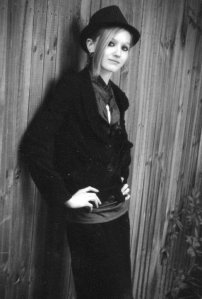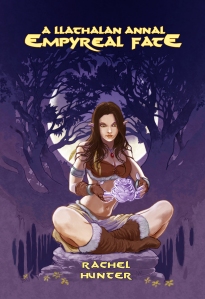I have another guest post, this time from Rachael Rawlings. If you’re a fan of ghost stories and the paranormal you will want to put her on your reading list.
I would like to thank Michael for letting me stop by on my blog hop. This is my last entry, and I have to say, it has been fun. I feel like writing these blogs has given me a great opportunity to reflect on my own journey to becoming an author, but also has given me insights into the lives of fellow authors. One of the most enjoyable things about the writing community is finding those like minded people who live from story to story.
I have been writing for fun since grade school, and won my first award in fourth grade for a poem I wrote. I think that gave me the bug to begin writing, and I haven’t stopped since.
My most recent published work is Dearly Departed, part one in my Grave Reminders series. I have completed five novels to be published by Hydra Publications, and am working on a sixth.
Dearly Departed is a mixture of a mystery and ghost story, with a bit of paranormal romance thrown in. Although I wrote it from the viewpoint of an eighteen year old, I hope that there are other readers like me who enjoy reading the young adult novels, even if we’re a little past that stage in our own life!
The main character in the series is actually not a character at all, but a place. Duncan Memorial Chapel is a charming little church set in a wooded cemetery within walking distance from my house. Surrounding the Chapel are homes that date back to when the Chapel was first built, and seem as much a part of the cemetery as the Chapel itself. I had spent many hours wondering what it would be like to live there, so close to the lovely little place, but shadowed by the idea of the cemetery spread out around it.
The second in the Grave Reminders series will also be set in the same little neighborhood surrounding the cemetery, and we will revisit some of the characters we have already met in Dearly Departed as well as introduce several new ones. I cannot help but throw in a little romance as well, since I am definitely a romantic at heart.
At the same time, I am preparing for the release of my other novel, The Parrot Told Me, which is a departure from the paranormal genre. In this novel, I write about a subject near and dear to my heart, African Grey Parrots. The heroine in the story hears her adopted parrot mimicking a conversation that he has learned from his former owner. But his former owner has tragically died, and although everyone else has accepted that it was a horrible accident, the heroine has her doubts.
Both of these novels should be released in 2013!
I invite readers to connect with me, comment, or ask questions at:
http://www.facebook.com/rachael.l.rawlings my facebook page, and http://www.facebook.com/rachael.l.rawlings#!/pages/Rachael-Rawlings/129369250475811 my author’s page. My book can be found at http://www.amazon.com/Dearly-Departed-Grave-Reminders-Volume/dp/0615680186/ref=sr_1_1?ie=UTF8&qid=1347582584&sr=8-1&keywords=rachael+rawlings. I am just starting a blog, and hope to link it to my Facebook page once I have it completed.
Dearly Departed
Grave Reminders Series
“You’re out late.”
His voice came, filtered through the heavy air, deep and hushed.
“So are you, I suppose.” I tried to keep my voice as even as his.
“As always,” he replied, finally reaching the soft light of the moon. He paused and leaned against the low stone wall, comfortably.
The moonshine was generous to his sharp features, softening them with the forgiveness of the night. He was all angles and long lines, from the sharp blade of his nose to the golden arch of his brows. His eyes were impossible to see, but his hands were beautiful where they rested on a moss lined stone. A heavy gold band circled his thumb, looking tarnished in the dim light.
“It’s a quiet night.” The words that came were not the ones that I would have reasonably spoken. This was not a conversation that had any of the norms of social interaction.
“Not so much. The birds are complaining. They don’t like the fog.”
I looked at him, immersed in the unreality of the scene. “You know much about birds?”
“More about the night. I don’t sleep much. I tend to travel most often at night.”
That explained a little, but not nearly enough to satisfy me.
“Why here?”
“I have my own reasons.” He returned softly, no sting to his words. “You watch. I walk. We all have our little ways of coping with the time.”
The conversation had little substance, but I was reluctant to leave him, even more to turn my back on him.
“Are you staying nearby?” The questions seemed general enough.
“You assume that I’m passing through? Yes, I am staying nearby.” He looked away, the sound of a car’s motor seeming unusually loud.
“And you’ll keep coming back?” My hushed voice was reverent for the people that lay there, silent in their soullessness.
“Until I find what I need.”
“And that is?” I honestly felt that I could help him. After years of living here, the graveyard had become my walking park, my backyard, and my pondering place. I knew most of the names intimately, as well as the familiar faces of the mourners that came to visit them.
“I’ll know it when I see it,” he responded with a frustrating calm.



 Posted by mgw
Posted by mgw 



